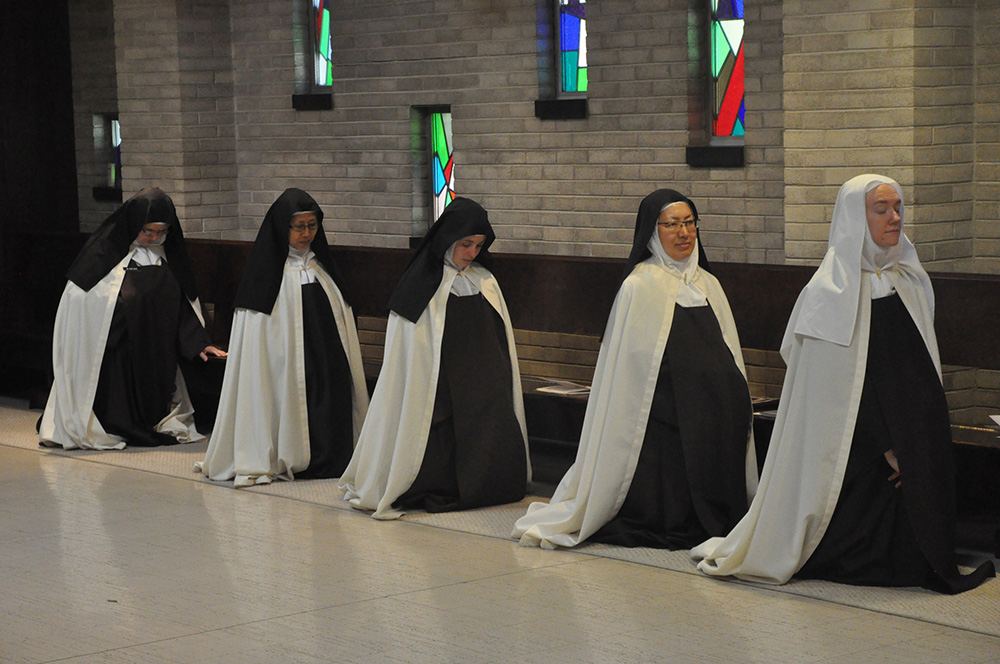Early on in Carmelite Rule — as written by St. Albert of Jerusalem, the Lawgiver of Carmel — is found its purpose: “Many and varied are the ways …” Those who seek Christ according to the life of Carmel are reminded it is one of various ways that lead to Christ. Are all people called to the Carmelite way in the life of the Church? No. Have many people been helped along Christ’s narrow way because of Carmel? Absolutely. Here are a few spiritual points from the Carmelite tradition that can help us along the pilgrim way that leads us to the narrow gate Christ invites us to enter.
Allegiance
Also early on in the rule is stated: “live a life of allegiance to Jesus Christ — how, pure in heart and stout in conscience, he must be unswerving in the service of his Master.” The foundation of the Carmelite spiritual path is allegiance. The charism of Carmel does not exist outside the Church because it is a fruit of the Church whose life comes from Jesus Christ. The life of a Carmelite is one of a radical commitment to living out their baptism. That radical commitment to one’s baptism for a Carmelite revolves around the call to allegiance. Jesus is the Lord. He is the one to whom the baptized are bound and obligated to give everything in this life. Via the Carmelite path, this allegiance is shown through prayer, by which the poverty of spirit is gained so all may be given over to Christ in love. A loving allegiance is what fuses one’s heart with the Sacred Heart of Jesus Christ. In his allegiance to Christ, the great Carmelite St. John of the Cross could write this maxim of love: “Live as though only God and yourself were in this world so that your heart may not be detained by anything human.”
Pure Hearts and Stout Consciences
Carmelite spirituality also addresses how this allegiance is lived out: by being “pure in heart and stout in conscience.” The Lord plays second fiddle to no one or anything. The Carmelites began at the prophet Elijah’s cave on Mount Carmel, so he is considered the order’s spiritual father. He taught us that a pure heart is one free from attachments and idols. Freedom’s purpose is for the sake of offering one’s heart entirely to the Lord. The Lord wants our whole heart, not just part of it. The call for a pure heart is why Carmelites are so focused on addressing attachments and calling out idols that steal the life of God from a Christian by defiling the heart and causing it to become confused. The freedom from confusion caused by attachments and idols is summarized beautifully by the great Carmelite St. Teresa of Ávila: “The closer one approaches to God, the simpler one becomes.”
Then there is the necessary stoutness that defines the conscience of a Carmelite. This stoutness is bravery, determination and strength. In other words, this means a life of virtue is necessary. The virtues form and shape one’s conscience. Stoutly living them means remaining in allegiance to Jesus Christ. Virtues are a constitutive element of Carmelite spirituality. Without them, there is no Carmelite. That does not mean a Carmelite always lives a perfectly virtuous life, but is called to strive for that kind of life. The Carmelite rule calls one to live according to common sense, which points to the virtue of prudence. As the Carmelite Br. Lawrence of the Resurrection wrote, “Lord of all pots and pans and things make me a saint by getting meals and washing up the plates!”
The Cell and Conversion
The Carmelite rule speaks a lot to the physical structure of Carmel. Thus, the order of the structure is essential. Significantly, St. Albert speaks to the need for each person to have a separate cell. This is important because it is from their cell that the Carmelite spirit is set on fire. The cell is like a forge, the place of private intimacy where one wrestles with the Lord like Jacob. In the cell, one is shaped to an image of the Christ that all Carmelites are called to be: the Christ who went into the wilderness to pray. It is in the cell where a Carmelite not only learns but understands how to pray. The cell is thus where a Carmelite flees to gain humility, because each Carmelite learns they cannot depend upon themselves. The intensity of the cell shows the Carmelite that there is no escaping oneself and God. It is through the cell that one begins to understand this Carmelite wisdom from St. John of the Cross: “He is humble who hides in his own nothingness and knows how to abandon himself to God.”
Carmel exists in the Church to help others learn how to live in allegiance to Jesus Christ. This is meant to be lived out on the pilgrimage of the baptized made during their life. If this pilgrimage seems too big, and the Carmelite path too grand, recall this message of Br. Lawrence, and be not afraid: “You need not cry very loud; He [the Lord] is nearer to us than we think.”
Father Nicholas Blackwell, O. Carm., writes from New York. Follow him on Twitter at @CarmeliteNick.

